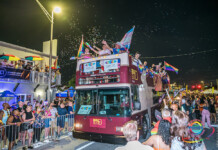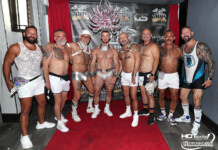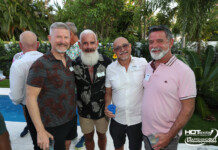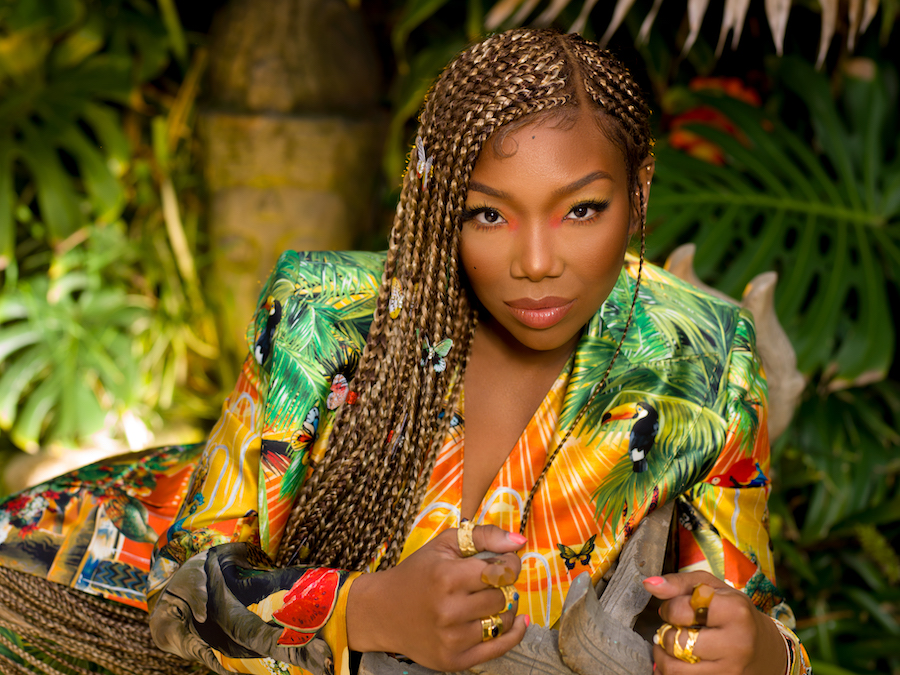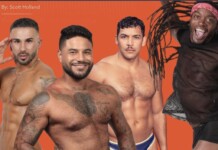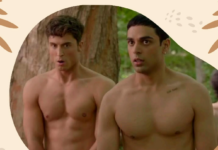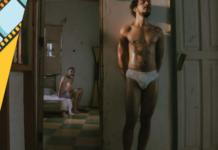A Better Version of Brandy
R&B icon talks loyal LGBTQ fans, returning to Pride and overcoming self-doubt
The light falling on R&B queen Brandy is casting tiny rainbows that dance above her head. She’s looking up at them, telling me what she sees. Little rainbows everywhere.
On an ordinary day, sure, this would be special. But on this particular day, as I speak with a confident and ruminative Brandy on Zoom, in depth, about her eagerness to get back to performing at Pride and the loyalty of her LGBTQ fans, it’s impossible not to read into this extraordinarily timed meteorological phenomenon as some kind of gay magic. In case you didn’t know how much mad love there is between Brandy and the LGBTQ community, well, here are some rainbows haloing Brandy’s head while she’s addressing that very love, it seems to say.
From her iconic sing-off with Monica on “The Boy Is Mine” and on through her remake of Cinderella with Whitney and her TV series Moesha, Brandy’s biggest LGBTQ fans have stood by her, their devotion never waning. In July, nearly 30 years after her self-titled debut made her an R&B star in 1993, she dropped B7, her seventh studio album, on her own record label, Brand Nu Inc. Now that Brandy is more in control of her identity and artistry, that bond has never been stronger.
Promoting B7 in the middle of a pandemic on Zoom – what has that experience been like?
It’s not like how it normally is, of course. I’m a people person; I love to interact, meet new fans, meet fans that have been with me for such a long time. But I am thankful for technology because we could just be on the phone and I wouldn’t be able to meet you like this. So (I’m) thankful in that way. But (I) definitely wish I could really be out there and socialize and hug people and shake hands, that kind of thing.
I’m sending you a virtual hug.
I’m sending you one too.
I’ve been a fan since I was a kid. We’re about the same age, but the difference is that I’ve watched you grow up.
It’s beautiful to meet people who have followed me and supported me all this time, so I appreciate you jumping on the Brandy board and being a part of my journey. And even in you being interested in talking to me.
Just to see you blossom into this independent woman where you get to make the calls, where you have autonomy, where you are a co-producer and co-writer. It’s extraordinary to see. Can you talk about how you got to that place?
I felt inspired this time around. I just wanted to follow the creativity, the flow, that was in me, that was inspiring me to use my music to tell a lot of the stories that I had gone through, my challenges with love and my mentality and where I stood with myself, and also just trying to find this new sound and this new way of approaching music.
It took me a minute, but I’m so glad that I was able to really dig deep and pull the real feelings, the real emotion for this project. Real lyrics that are coming from my heart, from my own journal, from my own spirit. It just feels a little bit different when most of the music is coming from you. It feels good to be in this place. And I want to, of course, continue to collaborate with other writers and other producers, but it feels good to have a center where I can go to and pull from, that I feel confident with.
When you have such a loyal fan base, do you get to a point where you can trust that they’ll go on any journey with you creatively?
I would have to say I feel like my fans have been loyal from day one, especially the diehard fans; they’ve been very supportive from my first album, to me moving into television and me being able to step outside of music and do things that I never saw myself doing or imagined myself doing.
I feel like people have grown up with me, and that started at the very beginning. But I could really also tell with the new project, just the anticipation, people wanting me to put out music and always asking, “When are we going to get new music?” When people still want to hear from you after you’ve been gone for eight years; that feels amazing. That people still have a yearning, have a want, have that feeling that they want to hear something from me… even if it’s “Happy Birthday”! (Laughs.) That feels amazing to have a loyal fan base like that.
These lyrics are some of the most real lyrics of your career. And you go deep. I have friends who are experiencing their own mental health issues and saying this album has really connected with them because you’re so open and vulnerable. Are you hearing that from fans?
I do. I know we have struggles, and we go through things that we wish we could change our behavior on, and things we have to face about ourselves, and I wanted to be one of the people to come forward and say that I’ve struggled in a lot of areas with my mentality, with my sanity, just with the kind of life that I’ve had to lead. A lot of trauma. A lot of PTSD that I’ve had to battle and face.
But there is light at the end of the tunnel because there’s work that you can do. You can talk to someone, you can journal. You can change the inner dialogue with yourself. It takes practice to get yourself on track, but there is light at the end of the tunnel. I wanted to show people that no matter what you go through, you’re always bigger than your circumstance, and you can always work on your mental issues. Always.
That’s such an important thing that I think we all need to hear right now, Brandy. We’re all going through something we’ve never experienced before, so the PTSD, the anxiety, the depression is intense. How are you working through this current moment?
I just have this deep empathy for everyone. My prayers for the world have increased. I’ve always prayed for world peace and togetherness, for us to be equal and unified, but my prayers have gotten longer and more frequent with what’s going on. But I just try to think maybe this whole entire moment is shifting us to a different level of awareness, a different level of consciousness. And maybe this thing that looks like a catastrophe is really the universe cleaning our mess up and helping us get to a better place.
And, of course, my heart goes out to the people that we have lost in these tragic times, but I feel like I have to believe that everything works for the higher good. At some point we will be better from this because a lot of light has been shed on a lot of the things that this world has had to face. Even though we’ve seen a lot of division, we’ve all seen a lot of unity in this time. We have to think on those things, and I think when we focus on those kinds of things – and being grateful for the smallest thing; like, I’m grateful for the pillow that I have to sleep on at night – you start to appreciate the smallest of the smallest things in life. I think we’re moving into a better space for ourselves, and I just pray that that’s the case. I really do.
What are you grateful for today?
Today I’m grateful that I’m able to speak with you about life and to share what I just shared with you today. I’m grateful for my family that I saw this morning. I’m grateful for the breakfast that I was able to eat this morning. I’m just grateful for oxygen. I’m grateful for these, like, rainbows that I see on my wall right now. Little rainbows on my wall. I’m just grateful for life and to have a purpose in life. To be here and not to feel like you have a purpose, that’s not a good place to be. And I want everybody to know that: If you’re alive, you have a purpose here.
God, you’re gonna make me cry.
Don’t you cry, Chris. (Laughs.)
I’m a big fan of “Lucid Dreams” from B7; it seems to detail a very personal story of you losing yourself. And I think we’re all at risk of that right now. Can you talk about that song and how you were able to get back to you and the work that it took to get there?
There was a time in my life where I felt like I needed another person to complete me, and that is not the ultimate truth. The ultimate truth is that we are whole. We are a whole person, and when you become whole – and when you realize that – you share your wholeness with another whole person.
“Lucid Dreams” is really about me losing myself in a relationship because I feel like I’m nothing without this person. So I’m addicted to sleep, chasing this recurring dream because in my dreams we’re together, but in reality, in the waking state, we had broken up, and that was a very, very hard time for me. And heartbreaks and hard times make for good songs, so I said, “Let me just go on and write about it and be honest about it.” If you listen to it, I’m making all of these healing sounds because I was using the song to heal a part of the leftover pain that I was feeling from that particular time in my life. But I’m completely over it, I’m free from that, which is great. I did the work to do it, and when you do the work, you do get results.
I’m about to pay you to be my therapist. An hour a week – how much?
(Laughs.) You know what, no one’s ever said that. Ev’rybody trying to send me to therapy! I’m kidding. (Laughs.) I love that, thank you. That’s a compliment.
You’re a regular Pride performer, and Pride was not the same this year. You didn’t get to perform at Pride. What do you feel you missed out on?
I absolutely love performing at Pride. The energy is just unmatched. And you can just tell the love for my music in the LGBTQ community is real. You feel like, “OK, they have my back. When I come on stage, they’re gonna give me that love I need. They’re gonna want me to do well. They’re gonna want me.” It feels like family. And I’m just so blessed to have the LGBTQ community to support me in such a way that I just… it feels awesome. And I miss that. I didn’t get to do anything for Pride. But count me in when it’s safe and ready to go, because I absolutely love it. I absolutely love performing at Pride.
It was nice to see you on a stage, on the Billboard stage, to be exact, where you blew it up. What’s it like performing in that kind of environment, in a pandemic, without a crowd?
It’s different. Because you feed off a crowd. And the applause. And the singing along. And the rooting you on. That is something that I definitely miss in terms of being on stage. But there’s also a focus that happens when there isn’t a crowd, where I’m only thinking of what I’m doing. But I would prefer a crowd over just being completely in my zone. I can get in my zone with a crowd, but it’s easier when the crowd isn’t there. But I miss the crowd.
You don’t have that instant feedback, right? It’s hard to know, “Am I doing OK, everyone?”
Yeah. And then the people that are there, that are working, they don’t act like a crowd, they don’t act like an audience. The 10 people that are separated doing camera shots, they’re not going to clap for you at the end.
They’re not like your gay fans. They don’t know every word to “Have You Ever,” “The Boy Is Mine,” “Almost Doesn’t Count,” “Sittin’ Up in My Room.”
Right! And the unreleased stuff. Your gay fans know your unreleased (stuff); that’s when you know you’re a real fan.
When in your career did you feel the most creatively stifled, like you couldn’t be who you wanted to be creatively?
I would have to say after the Full Moon album I kind of lost my way. And I say this in the most humble way, but so many artists started to approach music the way that I did. I started to hear a lot of my sound with so many different artists; I heard a lot of songs that sounded like the work that I had done, and so a part of me felt like, “Where’s my place? Do I have a place? Because everybody is starting to sound a little bit like me. And I don’t know what I can do now, like, ‘Do I take it to another place? Do I try not to sound like myself? What do I do?’” So I was a little bit confused as to the direction that I should go in. Or if I was even needed, if my music was even needed. But that was nonsense; that was negative thinking that was just me having a moment of just not knowing my place.
I got through that, and I was able to make more music after that, and I’m going to continue to make music, and I’m in a place where I’m stronger mentally in terms of just learning to trust my creative flow. And if I trust my creative flow, I don’t have to think about anything else but that. And if I’m true to that, then I’m true to my fans and I’m true to my purpose and my work, and that’s what’s important.
Do you think we’ll have to wait another eight years for the next one?
No, no! It’s not gonna be another eight years. It was eight years for a reason; it was for a lot of different reasons. I’m in a really great place, musically, creatively. And I have so many great opportunities. I’m a free spirit. I have my own label, I am writing my own songs; it’s just a different version of myself. It’s a better version of myself.
Of course I want to do other things outside of music, but I don’t think it’s fair to wait another eight years to put out music when the studio is right down the street. (Laughs.) People need music, people need music, and people that have the talent to share music should be doing music and that’s how I feel: It’s my responsibility. So I don’t want to wait eight more years. And I won’t. That’s a promise.
It sounds like you’re in a place where nothing is holding you back right now.
Nothing. Nothing is holding me back. And I have such great supporters. Like you today. Your energy is beautiful. You represent a whole community of people that love me, and you’re speaking for them to let me know that I’m loved out here and that feels… that’s an amazing feeling. So I owe you. I owe the LGBTQ community. I owe my fans music. And it’s a beautiful place, to be loved.
This interview was lightly edited and condensed for clarity.
As editor of Q Syndicate, the LGBTQ wire service, Chris Azzopardi has interviewed a multitude of superstars, including Cher, Meryl Streep, Mariah Carey and Beyoncé. His work has also appeared in The New York Times, Vanity Fair, GQ and Billboard. Reach him via Twitter @chrisazzopardi.


